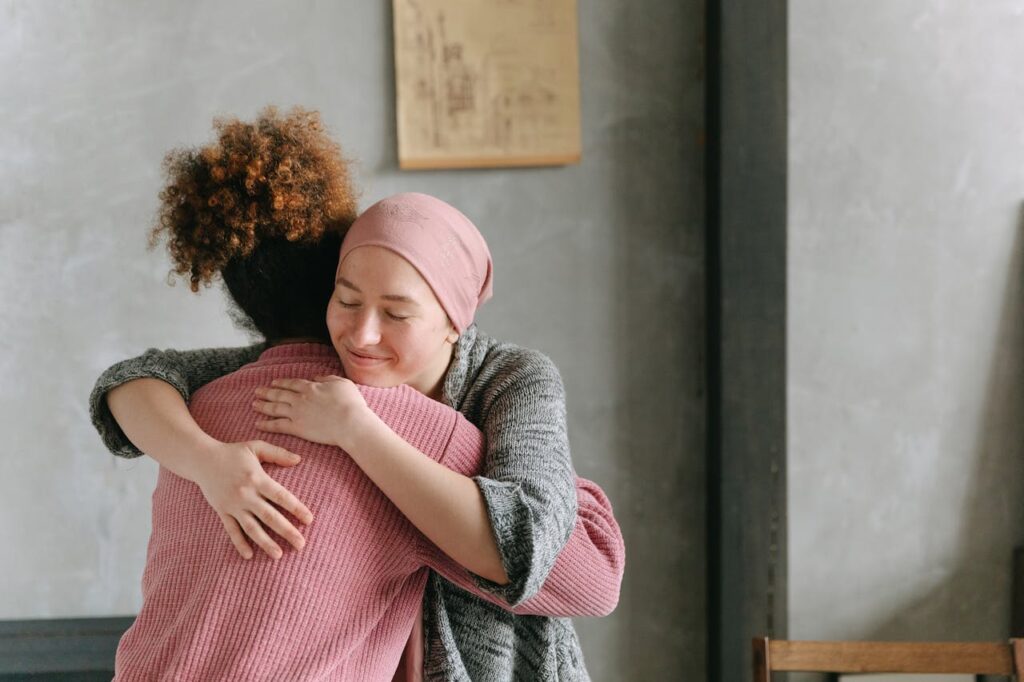Resentment is scientifically described as a negative emotional reaction to mistreatment. There are many cases highlighting the sense of being betrayed or hurt by someone can cause bitterness.
In this article, I share the story of two best friends, Kayna and Abigail who met at a seminar. As they shared the same values and interests, they have quickly developed a strong friendship. And suddenly, during a party organised by mutual friends – Abigail had repeated sensitive, personal information about Kayna to another friend. Keyna felt betrayed and hurt and started disctancing herself from Abigail, ending their precious friendship.
Meet Abigail et Kayna
Kayna, a dynamic and passionate young woman, enrolled in a workshop in caring communication at City and Islington College, located in North London – in hopes of improving her personal and professional relationships. During this workshop she met Abigail, a warm and empathetic woman who shared her values and aspirations. Quickly, a sincere and deep friendship was formed between them, and they became inseparable.
As the months went by, their complicity grew and they confided in each other their most intimate secrets. Kayna finally felt understood and supported, while Abigail found in her a loyal and devoted friend. They spent long hours discussing their dreams, fears and hopes for the future.
However, one day, during an evening with friends, an unexpected event overshadowed this beautiful friendship. Abigail, in a moment of inattention and without malicious intent, revealed a very personal secret about Kayna to another friend present. The latter, not measuring the impact of this revelation, let the information slip in front of other people.
Kayna, who had just learned of Abigail’s unintentional betrayal, felt hurt and humiliated. Her confidence in her friend was shaken, and she couldn’t help but feel a deep anger towards her. Despite Abigail’s attempts to apologise and explain her actions, Kayna decided to distance herself and break off their friendship.
Thus began Kayna’s journey, consumed by resentment and pain, looking for a way to overcome this wound and find inner peace.
The beginning of the path to forgiveness

As weeks passed, Kayna realised that her anger and resentment towards Abigail were only worsening her unhappiness. She felt trapped in her negative emotions and was desperately looking for a way to free herself from her. One Sunday morning, in search of spiritual comfort, she opened her Bible and came across a passage that would change her life.
The verse in Matthew 6:14-15 spoke directly to her: “For if you forgive others their trespasses, your heavenly Father will also forgive you; but if you do not forgive others, neither will your Father forgive you your trespasses.” Touched by these words, Kayna realised the importance of forgiveness and decided to embark on a healing process.
She began by learning about the different approaches to forgiveness, both from a psychological and spiritual point of view. She discovered that forgiveness had beneficial effects on mental and physical health, and that it was essential for maintaining healthy and harmonious relationships with others.
Inspired by these teachings, Kayna decided to apply these principles to her own situation. She undertook a work of introspection and meditation to understand the reasons for her resentment and to learn to see the situation from a different angle. She realised that although Abigail had made a mistake, she had not acted maliciously.
As she progressed, Kayna learned to develop empathy for Abigail and accept the fact that human beings are flawed and make mistakes. This realisation allowed her to progress towards forgiveness and to feel a gradual appeasement of her anger and resentment.
Reconciliation with Abigail

As time went by, Kayna felt a profound change in herself. She had not only learned to forgive Abigail but also to forgive herself for letting anger and resentment take over her heart. Armed with this new perspective, she decided it was time to reconnect with Abigail and try to repair their broken friendship.
One sunny afternoon, Kayna picked up her phone and dialed Abigail’s number, her heart pounding. When her friend picked up the phone, Kayna summoned up the courage and explained that she had been working on herself to learn to forgive, and that she wanted to offer her forgiveness. In addition, she asked Abigail for forgiveness for walking away without explanation.
Abigail, moved and touched by Kayna’s heartfelt words, gladly accepted her forgiveness and also expressed her regret for the situation. The two friends had a deep and genuine conversation, during which they rediscovered and reconciled.
This reconciliation marked a turning point in Kayna’s life. By forgiving Abigail and herself, she had not only regained a precious friendship, but had also discovered the liberating power of forgiveness. Through this experience, she had grown as an individual and strengthened her faith by following the teachings of the Bible.
Now, Kayna and Abigail were stronger than ever, united by a renewed bond of friendship nurtured by understanding, empathy, and forgiveness. Together, they continued to move forward on the path of life, convinced that the power of forgiveness was an essential key to living in harmony with oneself and with others.
Imagine a movie where you’re the main character and you fight for your peace, love and reconciliation with yourself. Do you think this world exists? Well, make it as if this world exists, and you’re part of it! Armed with the power of forgiveness, you are ready to confront the dark forces of resentment, and anger. But how would you put your superpower to work?

The Scientific Perpective of Forgiveness
Scientists studied effects of forgiveness on our bodies and minds. They found that this superpower can reduce stress, anxiety, and depression, while improving our immune system and sleep. Even our heart benefits, as forgiveness helps fight high blood pressure and heart disease.
Psychological Perspective
Psychologists have recorded the secrets of forgiveness, an emotional exercise that allows us to overcome negative feelings and restore harmony to our lives. Through forgiveness, we also develop resilience, the ability to bounce back from a hard blow and continue our quest for peace and happiness.
Spiritual Perspective
Most religions emphasise the importance of forgiveness as an act of mercy, compassion, and love towards others. In the bible, we are invited to practice forgiveness to purify ourselves and draw closer to divine truth (Matthew 18:22-35). “This is how my Heavenly Father will treat each of you unless you forgive your brother from your heart.” Said Jesus.
In short, forgiveness is a power that combines science, psychology and spirituality. By understanding this art, you will become a true hero everyday of your life, able to overcome the dark forces of anger and resentment to spread love and peace around you.
The Keys to Forgiveness
1. Humility
The first key is found in the treasury of King Solomon, the wise ruler who asked God for wisdom rather than wealth or glory. To learn to forgive, we must also cultivate humility and recognise our own imperfection. For, as the biblical saying goes: “Let him who has never sinned cast the first stone.” (John 8:7)
2. The compassion
In the parable of the Good Samaritan (Luke 10:25-37), Jesus teaches us the importance of compassion for our neighbors, even those who have hurt us. To forgive, we need to develop this compassion and seek to understand the motives of those who have harmed us. Remember, noble adventurer, that behind every enemy is a soul in search of redemption.
3. Letting go
The story of Job (Book of Job) shows us how this pious man was able to show patience and letting go in the face of the trials that God sent him. To forgive, we must also learn to let go of our resentments and our desires for revenge, in order to let divine grace heal our wounds.
4. Multiplying Forgiveness
Inspired by the miracle of the multiplication of the loaves and fishes (Matthew 14:13-21), forgiveness is an inexhaustible resource that multiplies as it is offered to others. Do not be afraid, noble adventurer, to distribute your forgiveness generously around you, for it will return to you a hundredfold, like a heavenly manna that nourishes your soul.
5. The Resurrection of Love
Finally, the final key is found in the resurrection of Jesus (John 20:1-18), a symbol of divine love that triumphs over death and suffering. To learn to forgive, we must believe in the possibility of a rebirth of love and trust, even after the deepest wounds.
Now that you have discovered these sacred keys, all you have to do is use them to unlock the doors of forgiveness and spread love and peace in your inner realm. May divine grace accompany you on this epic quest!
Conclusion
And so, you have reached the end of this epic of forgiveness. Thanks to the precious keys you have discovered along the way, you are now ready to face life’s challenges with wisdom, compassion, and love.
Forgiveness is certainly not an easy task, but it is essential to cultivate harmony and inner peace. By tapping into the infinite resources of humility, compassion, letting go, generosity and love, you will be able to overcome the obstacles and conflicts along the way.
Never forget, that the power of forgiveness is an invaluable force that will allow you to heal your heart and strengthen your bonds with others. May you always keep these sacred keys handy and use them to spread light and peace in your inner realm and around you.
Kayna’s story offers us valuable lessons about the importance of forgiveness and how to overcome negative emotions that arise from conflict and hurt. Here’s a recap of the lessons learned from his journey:
- Acknowledge and accept her negative emotions : Kayna first became aware of her anger and resentment towards Abigail. Accepting these emotions is a crucial step in starting the healing process.
- Seeking inspiration and guidance from the Bilble: Kayna found teachings about forgiveness in the Bible that helped her understand its importance and embark on a healing process.
- Educate herself on forgiveness : Kayna has studied the different approaches to forgiveness, both from a psychological and spiritual point of view, to better understand this complex and multidimensional concept.
- Showing empathy and understanding : By seeking to understand the reasons for Abigail’s mistake and developing empathy for her, Kayna was able to move towards forgiveness and soothe her negative emotions.
- Forgiving Yourself : Kayna also learned to forgive herself for letting anger and resentment take over her heart, which allowed her to grow as an individual and strengthen her faith.
- Reconnecting and reconciling : Strengthened by her inner transformation, Kayna reconnected with Abigail to offer forgiveness and repair their broken friendship.
- Understanding the positive impact of forgiveness on mental and physical health, as well as relationships : Kayna’s story highlights the benefits of forgiveness for our well-being and relationships with others, fostering harmony, inner peace, and resilience in the face of life’s challenges.
In sum, Kayna’s journey reminds us that forgiveness is an essential step in overcoming emotional wounds, growing as an individual, and maintaining healthy and harmonious relationships with others.
Now is the time to apply the learnings from Kayna’s epic to improve your own life and relationships with others.
Subscribe Now
Q&A
Q: What are the main lessons learned from Kayna’s story?
A: Kayna’s story highlights the importance of forgiveness, acknowledging and accepting negative emotions, empathy, forgiving oneself, and reconciliation to improve one’s life and relationships with others.
Q: How can I apply these teachings in my own life?
A: To put these lessons into practice, it is important to open your heart to forgiveness, develop empathy and understanding for others, cultivate resilience and kindness, and love unconditionally.
Q: What role do biblical teachings play in the journey to forgiveness?
A: Biblical teachings offer valuable and inspiring guidance to guide our path to forgiveness. They remind us of the importance of humility, compassion, letting go, generosity and love.
Q: How do I subscribe to the newsletter?
A: To subscribe to our newsletter and receive regular tips, stories, and information about forgiveness and personal growth, simply click on the “Subscribe Now” link and provide your email address.
Q: What will I receive if I subscribe to the newsletter?
A: By subscribing to our newsletter, you’ll receive a treasure trove of enlightening content, expert advice, and captivating stories to help you navigate life’s changing waters with grace, compassion, and love.

